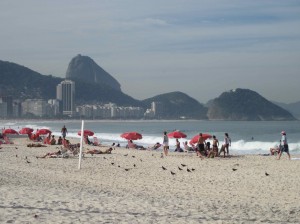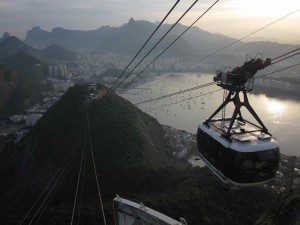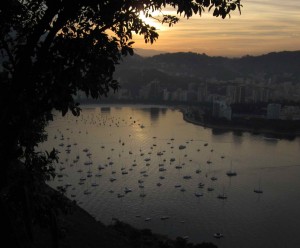After we drove from the airport and checked into our apartment on July 11, we visited the beach. Paul was completely at ease as he ordered caipirinhas (the national cocktail made from cachaça or sugar cane rum) at a beachside stand. David, Paul and I drank chopp, the Brazilian word for draft beer. After we had snacked on a pizza, we telephoned Marcos Antonio, the taxi driver, who drove us Pão de Açúcar or Sugarloaf.
The ascent to Sugarloaf has two stages. The first tram ascends the Morro de Urca, which has its own spectacular views of the Botafogo district. Then a second tram climbs Pão de Açúcar itself, for a panorama toward the Atlantic (to the south) and the Bay of Guanabara (to the northeast). The hillsides are sheer, and we spotted a climber making his way up Sugarloaf. I was glad we could take the tram.
We stayed until dusk, and might have stayed longer, except that we knew that the taxi driver was waiting for us. We were all tired from our international travels, but glad to be together in Rio. We returned to our apartment, and then walked to “Emir” — a Middle Eastern restaurant. There we dined on a variety of dishes, of which I can only remember the delicious couscous. The next day we went to the Lake District and the botanical garden.




My mom and I are having a good time looking at your site. We are glad you visited our country, Brazil.